Mourning amid merriment: Can Indonesia put the brakes on fatal accidents during end-Ramadan travel rush?
Thousands of traffic accidents are recorded every year as millions of Indonesians travel to their hometowns in a tradition known locally as mudik. While the latest tally marks a decline, analysts caution that a long road lies ahead in resolving the issue.
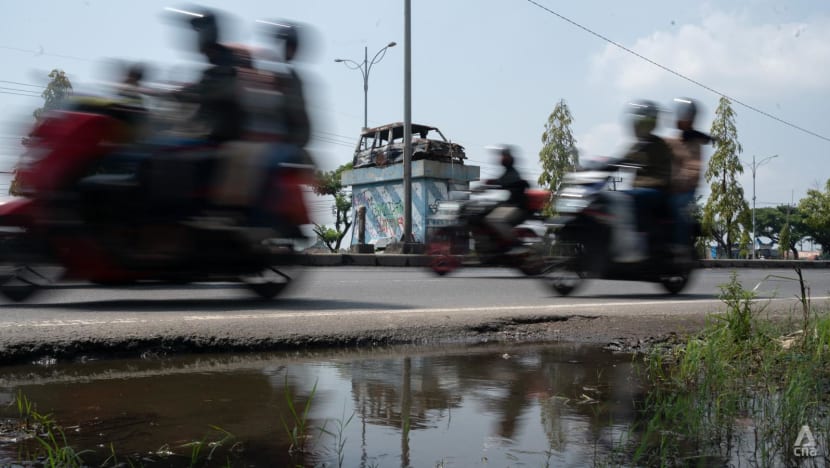

This audio is AI-generated.
JAKARTA: All the sisters wanted for the Islamic holiday Idul Fitri was to spend time with relatives and visit the grave of their recently deceased father in Kuningan, a mountainous Indonesian regency 270km away from their homes in the outskirts of Jakarta.
But tragedy struck less than a third into their journey. The sisters - Najwa Ghefira, 22 and Aisya Hasna Humaira, 19 - had their lives cut short when the rental minivan they were in suddenly veered to the right and rammed into an oncoming bus.
All 12 people in the minivan died in the Apr 8 morning crash. The bus occupants were largely unscathed, except for the backup driver who was rushed to hospital. He was not seated at the time and was flung to the front of the vehicle.
This was but one of nearly 2,900 accidents recorded across Indonesia during the festive period this year - and the tally is already lower than in previous years.
Even as authorities strive to bring down the numbers, analysts caution that a long road lies ahead, citing long-standing issues such as lack of infrastructure and lax attitudes towards safety that need to be properly addressed.
A COSTLY TOLL
Idul Fitri, which fell on Apr 10 this year, marks the end of the fasting month Ramadan. Every year, millions of people in Muslim-majority Indonesia travel from the cities to their hometowns and villages, a tradition known locally as mudik, to celebrate the occasion with their families.
The Indonesian Ministry for Transportation estimates that 193 million people performed mudik this year, a 13.7 per cent increase from the year before.
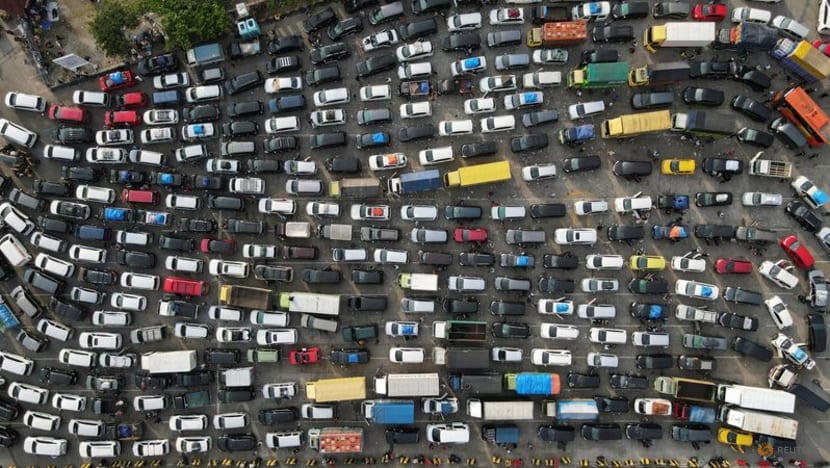
While typically a time of joy and festivities for Muslims around the world, Idul Fitri is also a time of grief and mourning for Indonesians who lose their family members and friends to mudik-related accidents.
This year’s mudik season lasted from Apr 4 to 18. During this time, the Indonesian Traffic Police Corps recorded 2,895 accidents which resulted in 429 deaths.
The figure is lower than the years before, except for 2020 and 2021 when the COVID-19 pandemic was at its peak. During the 2023 mudik season, there were 3,412 accidents and a death toll of 519. The year before, there were 4,107 accidents, killing a total of 568.
The downward trend can be attributed to several factors, analysts say. One is the opening of more toll roads which shorten travel time and reduce driver fatigue.
“More toll roads means more ways authorities can manage the flow of cars to and from cities,” Mr Yayat Supriatna, a transportation and urban planning expert from Jakarta’s Trisakti University, told CNA.
Another point is the availability of more mass transportation options. For instance, Southeast Asia’s first high-speed train, Whoosh, which connects Jakarta and Bandung in West Java. It was launched last October.
MULTITUDE OF FACTORS
Indonesian police have listed reckless driving, bad weather and fatigue as causes for these accidents. However, experts point out that poorly maintained roads, a lack of resting facilities, inadequate mass transportation services and lax enforcement of traffic laws are also to blame.
In the crash which killed the sisters Najwa and Aisya, the minivan was not licensed to transport people for money and was supposed to carry a maximum of nine people instead of 12.
The driver, police discovered, had been transporting passengers to and from Jakarta for four days with little rest and had fallen asleep at the wheel. He was killed in the accident.
Similarly on Apr 11, a bus carrying 32 passengers veered off the road and slammed into a ditch near the town of Batang, Central Java when the driver briefly dozed off. Eight passengers were killed in the accident and the bus driver has been arrested.
National legislation requires every long-distance bus to have at least two drivers, each taking the wheel for a maximum of four hours at a time.
“But authorities rarely conduct checks to see if bus operators and their drivers meet this requirement,” Mr Darmaningtyas, chairman of the think-tank Transportation Study Institute (INSTRAN), told CNA.
Mr Djoko Setijowarno, a transportation expert from Central Java’s Soegijapranata University said the government also needs to build more resting facilities.
“There must be rest areas every few kilometres on toll roads and inter-city roads. Every terminal and tourist destination must also equip themselves with a lounge where drivers can rest and sleep. And there should be officials who make sure that they make the most out of these facilities,” he told CNA.
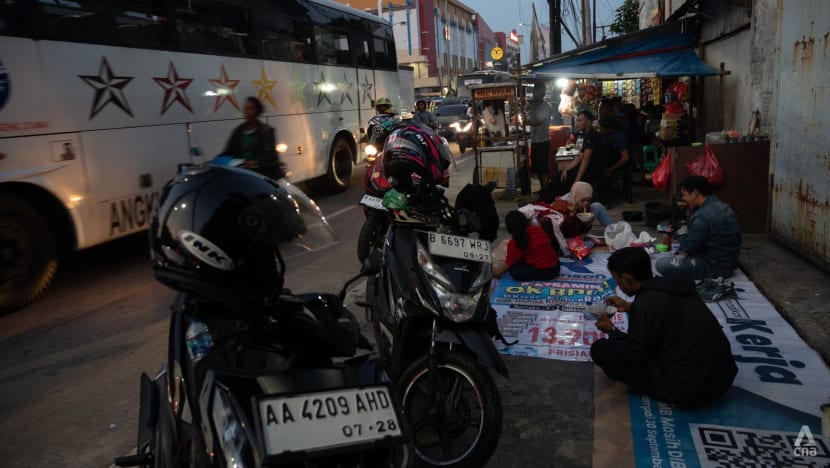
THE IMPORTANCE OF STRAPPING IN
Analysts also point out that the death toll in the two accidents could have been lower had the passengers wore safety belts.
Traffic laws state that for private vehicles, only the driver and the front passenger are required to wear safety belts.
Meanwhile, every bus seat must be equipped with safety belts. But this regulation is rarely enforced, analysts note.
“Some newer buses do have seatbelts but no one is wearing them, not even the drivers, because no one is enforcing the regulation,” Mr Djoko said.
Mr Hendro Sugiatno, the transportation ministry’s director general for land transportation said the government aims to tighten checks and inspections to make sure the rules are followed.
“In light of the high number of accidents involving public transport, the transportation ministry is instructing all bus operators to ensure that all drivers and passengers wear safety belts to reduce the rate of fatalities during accidents,” Mr Hendro said in a statement on Apr 14.
The director general also vowed to take long-haul buses with sub-standard safety features - like having faulty or no safety belts, fire extinguishers and emergency hammers - off the road by suspending or revoking their permits.
Meanwhile, police have vowed to take action against minivans that illegally transport paying passengers without a permit.
“We will coordinate with the Ministry of Transportation on the matter,” Indonesian national police spokesman Trunoyudo Wisnu Andiko told reporters on Apr 15.
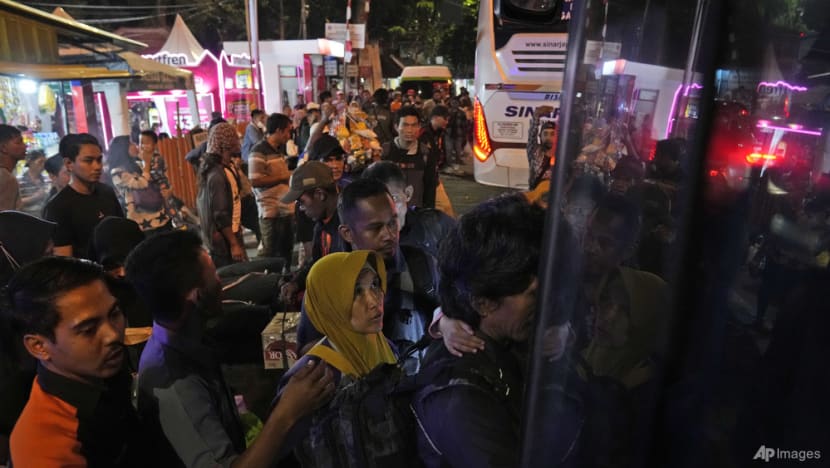
“A LOT OF WORK TO DO”
The annual festive exodus is not unique to Indonesia.
In Malaysia, millions of people also hit the road ahead of Idul Fitri, known locally as Hari Raya, travelling from urban centres like Kuala Lumpur and Johor Bahru to return to their hometowns. The practice is known there as “balik kampung” or “return to the village”.
During this year’s balik kampung season, authorities in Malaysia recorded 119 deaths caused by accidents, Bernama reported.
In Thailand, over five million people travelled to their hometowns and other destinations during the Songkran festival marking the Thai New Year, which fell on April 13. There were 243 road accident-related deaths during the six-day holiday period, reported the Bangkok Post.
A similar tradition happens in China ahead of Chinese New Year when billions of trips are made during the festive period. The Spring Festival or “chunyun” travel rush is the world's largest annual human migration.
The key distinction is that Indonesians hold lax attitudes towards road safety, often ignoring traffic regulations, signs and speed limits, according to observers.
Transportation expert Mr Yayat said to significantly reduce the number of accidents, Indonesia should take bad drivers and poorly maintained vehicles off the road. People should also be encouraged to take trains instead, which are regularly inspected and maintained.
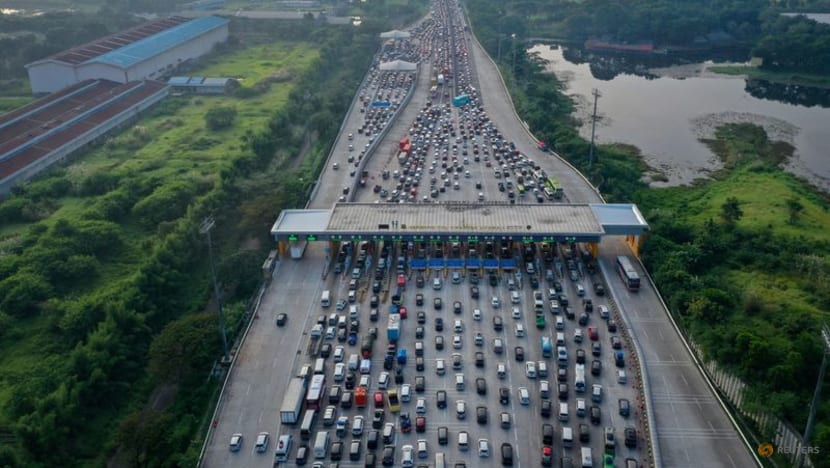
Mr Yayat noted that Indonesians actually prefer to commute via train for mudik instead of driving and getting stuck for hours in bumper-to-bumper traffic.
But infrastructure is a sticking point even as more people do decide to make the switch, he noted.
According to an Indonesian transportation ministry estimate, demand for train tickets during mudik can reach 34 million passengers. However, the country’s trains can only accommodate 3,31 million passengers.
In contrast, the rail network in China can see more than 400 million trips made during the 40-day Spring Festival travel rush.
“We don’t have a good train network like China. Not every city and town is connected to a rail network,” Mr Yayat said.
He also highlighted how Indonesia has “countless” level crossings, including those which are unmanned. “Adding more trains can be dangerous for motorists at these crossings,” he added.
“We need more infrastructure. We need to get rid of level crossings, by building overpasses. We need double tracks or even triple tracks in some areas. We need to expand our rail network,” Mr Yayat emphasised.
“We still have a lot of work to do and it takes time.”










.jpg?itok=0VNR9_Wi)


